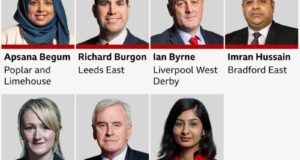
Liz Truss spoke to the BBC’s Laura Kuenssberg.
Mistakes were made over the mini-budget, Liz Truss acknowledged, but the prime minister has said she is standing by her tax-cutting plan as she refused to rule out public spending cuts.
The prime minister admitted she could have done more to prepare the ground for Kwasi Kwarteng’s financial statement, which spooked the markets, sent the pound plummeting and forced a £65 billion intervention by the Bank of England to restore order.
Ms Truss said the mini-budget’s most controversial measure – the abolition of the 45% tax rate on earnings over £150,000 – was not discussed with the Cabinet and was a decision made by the chancellor.
As the Tory conference gets under way in Birmingham, Ms Truss faced a difficult task in reassuring the markets and Conservative members unnerved by the market turbulence and opinion poll crash suffered since she took office.
“I do want to say to people I understand their worries about what has happened this week,” she told the BBC’s Sunday With Laura Kuenssberg.
“I do stand by the package we announced and I stand by the fact we announced it quickly, because we had to act.
“But I do accept we should have laid the ground better… I have learnt from that and I will make sure that in future we do a better job of laying the ground.”
During the interview, Ms Truss made Mr Kwarteng own the controversial decision to scrap the top 45% tax rate, saying it was not discussed with the wider Cabinet.
“No, no, we didn’t. It was a decision the chancellor made,” she said, though she also strongly defended the policy.
Her words prompted former culture secretary Nadine Dorries to lash out at Liz Truss for “throwing your chancellor under a bus.”
Ms Dorries, a staunch ally of Ms Truss’s predecessor in No 10 who also backed Ms Truss in the leadership contest, tweeted: “One of [Boris Johnson’s] faults was that he could sometimes be too loyal and he got that.
“However, there is a balance and throwing your chancellor under a bus on the first day of conference really isn’t it. [Fingers crossed] things improve and settle down from now.”
Meanwhile, the general secretary of the National Union of Rail, Maritime and Transport Workers (RMT), Mick Lynch, issued his own scathing assessment of Ms Truss’ comments, on Sunday.
Speaking at a rally in Birmingham city centre he told that he refuted the prime minister’s claim that she could have done more to prepare the ground for the chancellor.
He said: “They laid the ground. They put it in a book called Britannia Unchained, where they called us lazy workers. That we didn’t have the right to live in Britain. If you read the stuff that they’ve published, Kwasi Kwarteng has been publishing the most right wing vitriol for the last ten years.
“And what he’s going to do is spend more time at cocktail parties with bankers and city financers. They’ve laid it. It’s just that we’ve got to bring it to the attention of the working people of Britain and that’s what we’re going to do through rallies like this.”
The Conservative Party conference kicked off on Sunday with a minute’s silence in memory of the late Queen.
Ms Truss and her Cabinet were in the front row of hall one at Birmingham’s International Convention Centre (ICC), as members remained standing to sing the national anthem in praise of King Charles III.
Party members were also shown a video montage of recollections of the Queen, from former Conservative prime ministers Sir John Major, David Cameron, Theresa May and Boris Johnson.
Public service cuts not ruled out
Ms Truss did not rule out cuts to public services, saying they will remain “excellent.”
The prime minister said: “What I’m going to do is make sure we get value for money for the taxpayer.
“But I’m very, very committed to making sure we’ve got excellent frontline public services.
“And I’m not going to go into what the chancellor will announce in his medium-term fiscal plan. He’s going to announce that very shortly, it will come together with an OBR forecast.”
Pressed on whether her refusal to rule out cuts suggested that she will go down that path, she said: “No it doesn’t, because I can’t exactly set out what is going to be in this plan. What I can promise is we’re going to reduce debt as a proportion of GDP.”
No guarantee on benefits
Ms Truss was clear that pensions will rise in line with inflation, saying she has “committed to the triple lock” protecting them against price increases.
But she refused to give the same guarantee for benefits and government departmental budgets.
Not ruling out rowing back on Boris Johnson’s promise to raise benefit payments in line with inflation, she said: “This is something the Department of Work and Pensions Secretary [Chloe Smith] is looking at at the moment.
“She will make a determination on that and we will announce that this autumn.”
What if Tories vote against the plans?
Despite the unrest among critics and even within Tory party ranks, Conservative MPs who vote against the government’s plan for tax cuts will lose the whip, according to the party chairman.
It has been reported that some Tory MPs are preparing to vote with Labour to prevent measures announced by the chancellor, including abolishing the top rate of income tax.
Asked on Sky’s Sophy Ridge on Sunday whether this would result in them losing the party whip, Conservative chairman Jake Berry said: “Yes.”
He also urged Tory MPs to unite behind Ms Truss and her programme, saying she had “a mandate both from colleagues and our membership”.
He said: “I’m sure that if we do that it will lead ultimately to long-term electoral success.”
But former cabinet minister Michael Gove said Ms Truss’ plans had “the wrong values” and hinted he could vote against them in the Commons.
He told the BBC the prime minister was right to acknowledge that the events of the mini-budget “need to be revisited, there needs to be a recognition of mistakes”.
“But it is still the case that there is an inadequate realisation at the top of government about the scale of change required,” he said.
“Yes, the energy package was the most important thing in the fiscal event, but broadly 35% of the additional money that we are borrowing is not to cut energy costs, it is for unfunded tax cuts.”
Pressed on whether he would vote for the measures in the Commons, he said: “I don’t believe it’s right.”
 Weekly Bangla Mirror | Bangla Mirror, Bangladeshi news in UK, bangla mirror news
Weekly Bangla Mirror | Bangla Mirror, Bangladeshi news in UK, bangla mirror news







